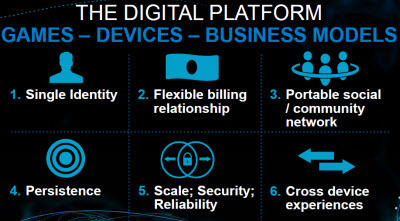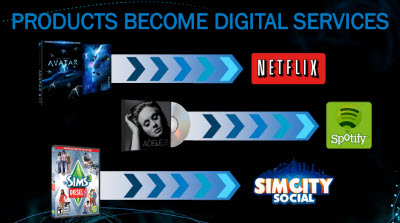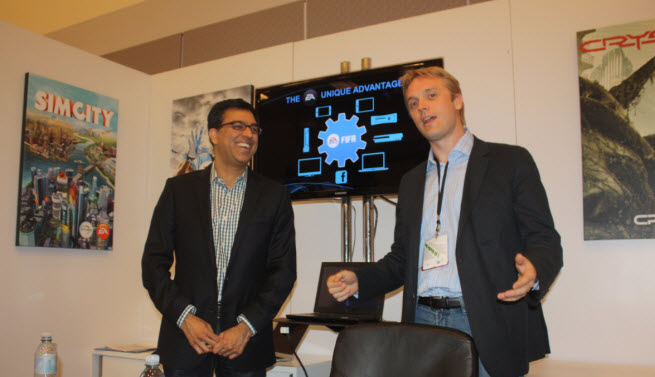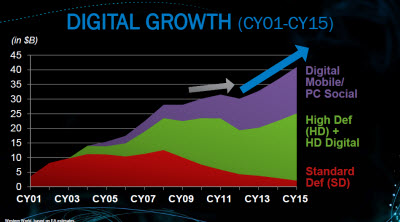Electronic Arts generated $1.2 billion in digital game revenues in the past year. That includes revenues from downloadable content, Facebook games, web titles, mobile games, and other non-retail categories. But that’s just the beginning of EA’s transformation into a digital game company, since chief executive John Riccitiello says that games are moving from “that disk you buy to a place you go.”
Making that place into a good experience for gamers is the job of Rajat Taneja, EA’s chief technology officer, and Kristian Segerstrale, executive vice president of digital gaming at the company. Taneja is heading an effort to create a single sign-on and user experience for gamers who play EA games on any platform. If you start a game on one platform, you should be able to pick it up on another. Segerstrale, who co-founded the Playfish company that EA bought for $400 million in 2009, heads the company’s digital efforts in social and mobile games. We caught up with them at the Electronic Entertainment Expo (E3) video game conference in Los Angeles last week. Here is an edited transcript of our interview.
 GamesBeat: Let’s start with you Raj. Please explain your role, since you’re the new chief technology officer.
GamesBeat: Let’s start with you Raj. Please explain your role, since you’re the new chief technology officer.
Rajat Taneja: Sure. I joined the company in October. I’m an engineer. Part of my role was to manage and develop the engineering operations of the underlying platform that supports Xbox, Office 365, Azure, and so on.
I came to EA because I really believed in the vision that John had for the future of gaming, and the part that technology could play to fundamentally change the direction for EA, but also set the standard for the industry. So what I’ve been doing is leading a team of about 1,500 people at the company to build a platform that will be the underlying connective tissue of all our games. This morning, for the first time, we explained to the public and our investor community what we mean by platform.
We are building an EA-wide single platform that every game can connect with and, in a consistent and convenient way, have common services. When you come into an EA game, when you see friends, when you see matchmaking, leaders, chat, it should be common and consistent in the way that it looks and feels.
When you want to play the same game on a different device, we should allow you to have a very easy and seamless experience moving your credentials, moving your team, moving your game events, achievements, etc. The platform has several particular capabilities that I wanted to quickly highlight that will showcase how we are doing this and why we’ve put such a big investment and such a big bet on it.
The first one is the notion of having a single identity. Once we know you as a gamer on each device, then suddenly we’re able to open up so many creative things that we can do to delight you in the game experience. Between the same game or even amongst different games. You can bring your own identifier, your e-mail address, your Gmail address, you can bring your phone number, you can bring a Facebook ID, and we will start tying it underneath the surface with technology.
The second one is, we want to have a direct billing relationship with you and respect your preferences and maintain that across all of your interactions with us across multiple devices.
The same goes for your friends circle, whether your friends came in from Google, whether they came in from Facebook, whether they came in from the phone, whether you like someone in the community that we have matched you with and want to continue to play with them, the same experience should also be seamless.
The fourth one is enabling persistence by having cloud saves. So as you play the game, we’ll be able to save everything to the cloud and position it back to where you are with the same experience right away.
The fifth one is all about changing the bar for our consumers, being higher performance, lower latencies, always up. We believe the expectation of the consumer market is going to be much higher than where things are today in the industry. Gamers accept downtime, gamers accept multiple logins, they accept that if their phone battery dies, they may lose game data. We believe that is no longer nice to have. It’s a must-have that the game should be high-performance, low latency, secure, all your gameplay should be saved, you should not have multiple logins and connections. Which will enable the cross-device experiences.
 GamesBeat: What is your role, Kristian?
GamesBeat: What is your role, Kristian?
Kristian Segerstrale: My role is the EVP digital. What that really means is I run the global consumer marketing. So all of acquisition, all the network engagement, the platform product management, we work very closely to make sure that we’re building the right commercial capabilities for us to operate in the world. Where a disc is only maybe a minor channel to market for the company. And the company relies on global analytics.
Today, when you look around the show and you kind of think about the games industry, we mostly think about either specific titles or we think about specific gaming platforms. We think about the mobile games industry or the Apple App Store. We think about social games and what’s happening on Facebook, or we think about consoles and what might be happening in the living room. What the next generation will bring around is different. We actually have a fundamental belief as a company that where gaming is going, the true next generation of games, is not a mobile games market and a social games market and a PC games market and a console market. But rather, just games, if you like. Just unified experiences across all these different screens.
So we are really believers that the games industry will transform over the next couple of years, to be entirely service-driven. [We’ll move] from a world where a superpower used to be shipping boxes to retailers, and creating great experiences on individual discs, into a world where our superpower is managing consumer relationships and building delightful consumer experiences for the screen, across devices and across franchises.
So the basic capabilities that we’re putting into place behind the scenes are manifesting themselves a little bit this year. You can carry over your achievements and your profile from FIFA Soccer 12 to FIFA Soccer 13. That’s something, right? We have a PC companion game already for FIFA Ultimate Team, we have an iPhone companion game this year. In Madden there’s now a career mode that you can manage from your iPhone.
So you’re kind of seeing these little baby steps in this direction already this year. But over time, we’re building is these seamless experiences, both across devices and across franchises.
 GamesBeat: How do you get around the problem that you want to create one platform, but in reality you’re using dozens of platforms? On console, at least, there are three or four guys who don’t want to operate on universality, right? And in mobile there are problems as well. How can you even try to create one platform when a lot of these things are not under your control?
GamesBeat: How do you get around the problem that you want to create one platform, but in reality you’re using dozens of platforms? On console, at least, there are three or four guys who don’t want to operate on universality, right? And in mobile there are problems as well. How can you even try to create one platform when a lot of these things are not under your control?
Taneja: It’s a journey of a thousand miles, and we’re taking one baby step at a time. We are starting to build those experiences that we can enable with our technologies. For example, you see with Scrabble, where we respect monetization through Facebook, we respect monetization of Scrabble on Apple’s iOS on the iPhone through their App Store. But we are able to connect the gamer, the gameplay, their game experiences very closely. So we are beginning to build this glue, and it will take us time to connect everything 100 percent, all the consoles, all the phones, all the social networks, etc.
Segerstrale: And I think one way to look at it is, that these devices are ready to become ecosystems. They are ecosystems with their own IDs, their own kind of commerce mechanisms. And what we are really looking to create are games that transcend that, that literally let you move from ecosystem to ecosystem very seamlessly, and retain all of that emotional investment you made on one ecosystem, like on an iPhone or your console game. And it’s true that today, it’s a really interesting sort of world where these ecosystems are clashing. Frankly, we’re holding ourselves responsible for helping get this to the right place for the consumer. We need to get into a place as an industry where we can offer amazing experiences for consumers without them feeling like they’re losing out on some stored value, some aspect of their achievement or wallet or something because they have moved from one platform to another. It doesn’t make sense for the consumer. There’s got to be a way for us as an industry to get around that.


